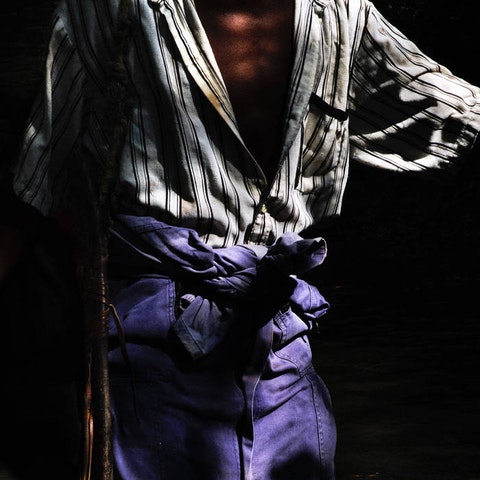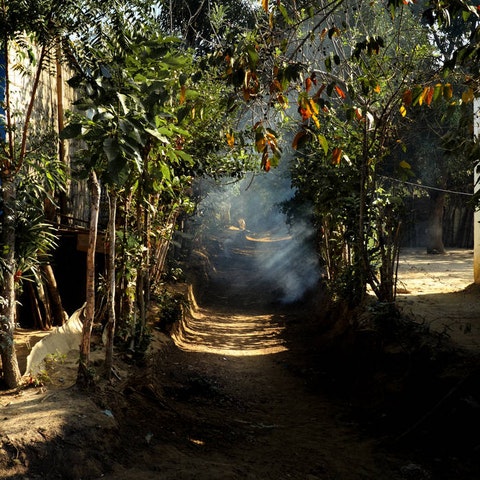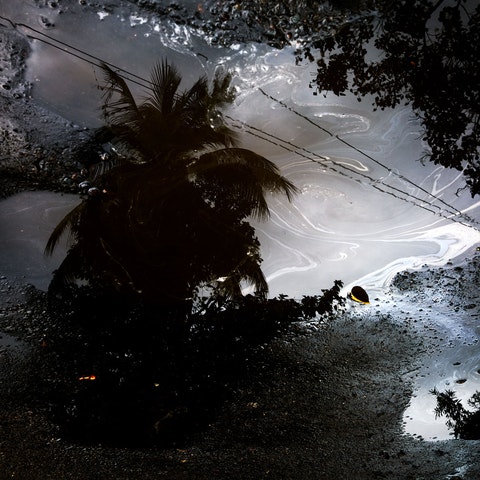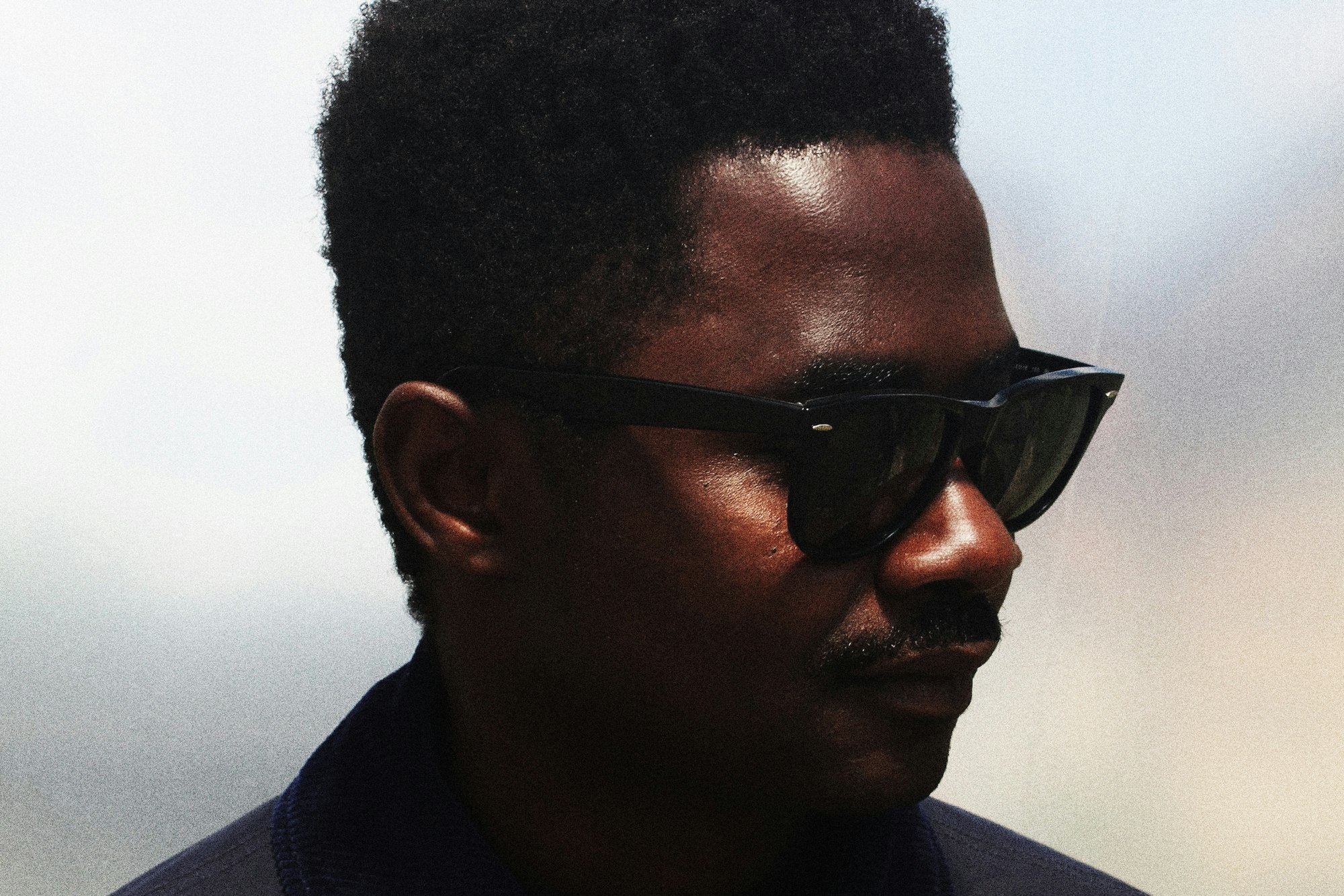Words by Patrick Swift
Growing up in a family that fled civil war in Sierra Leone in the late nineties, Lamin Fofana’s captivating, ambitious and experimental ambient music responds to the disruption he and his people have been subjected to. His music is a kind of resistance to all that violence and brutality.
The artist has just released an immersive new trilogy of works, comprising Ballad Air & Fire, Shafts of Sunlight and The Open Boat. Although Fofana’s work is largely instrumental, much of his music is accompanied by text excerpts from scholars and poets who have inspired him such as Amiri Baraka, Kamau Brathwaite, Derek Walcott and Édouard Glissant. Each offering is a box just waiting to be opened, leading the listener down a path to explore the complex themes of displacement, migration and diaspora.
Talking over Zoom, Fofana is mellow, but he admits that this is partly due to the fact that he’s run out of coffee in his Harlem home and is just drinking green tea. Prior to recently moving back to New York, he had been in Berlin for about five years. When his family fled Sierra Leone , they eventually settled in New York. He also has family on America’s east coast and in the DMV area (District of Columbia, Maryland, Virginia).
We begin our conversation by talking about how Fofana’s past has shaped his present. “There’s a certain way you look at things. I think, in general, Black people have always been in flight, you know? And I think sometimes in that flight, it could be the disruption of settler colonialism, and of course the movement of people from Africa to other parts of the world. It’s something I’m working out in a long-running theme since I’ve been aware, since I’ve been working on music.”



“The idea of being in flight, it’s not freedom, when you’re in flight you almost have that relief. You’re in between spaces, you’re fleeing catastrophe and you’re about to find relief, between catastrophe and relief. I think it’s just been the story of humanity, for the last five hundred years or so. So I feel like I connect my own history of fleeing as a refugee to the history of the world in the last five hundred years, which has disrupted the trajectory of how things were going prior. Specifically, I’m thinking about European expansionism and all the things that come with that like the settler colonialism which moved people from one place to another.”
Fofana speaks thoughtfully and articulately. It’s clear these are challenging concepts that he’s personally wrestled with, and is still wrestling them whenever he sits down to make music. Music making for Fofana began in middle school, buying CDs, reading the credits and building his own collection of music.
When you’re in flight, you’re in between spaces — between catastrophe and relief.
“I began to destroy my mom and my dad’s records, thinking I’m scratching them but I’m just destroying them. I always feel guilty when I visit my dad, he had such amazing records and I just ruined them all. I’m saying that because I think all of that is the beginning of starting to produce music…”
“I played percussion, various rhythmic instruments. Some of my friends were poets and rappers, and I would accompany them or they would bring me a part of an instrumental track that they’d ripped from a record and put on a CD that they wanted to rap over or put something on top of, and I would embellish it. I would expand it, loop and stitch it together but add some extra bits in there to flesh it out.”
Using a field recorder plays a huge part in Fofana’s work, and was crucial in the production of this new album triptych. This comes alongside a MIDI keyboard and his laptop, in what seems like a relatively straightforward setup. “I feel like with my Zoom field recorder, I’m constantly listening and recording. There are things lying about like a marimba, but it’s mostly the keyboard, laptop and field recordings. When I was at a six-month residency in Stuttgart, Akademie Schloss Solitude, there was a piano, more of a conventional setup for playing and getting ideas out. You just set the recorder and play and play and play. A few of the tracks in this triptych came out of those times."
"I would put stuff on and play for hours and try playing the same things over and over. I would record for two hours and then maybe five minutes in there will suffice, but sometimes I get lucky and I’ll have thirty minutes or forty minutes of something I can listen to. I’ll try different things, sustaining, maybe taping rocks to my fingers. Or holding certain keys down for a long, long time and getting all of the harmonics and things out of it.”
I would record for two hours - and then maybe five minutes in there will suffice.
Across Ballad Air & Fire, Shafts of Sunlight and The Open Boat there are intricacies, with details changing gradually like the passing of time. This is another place where Fofana’s Zoom recorder is vital. “When you’re recording and you have headphones on, everything is magnified. You become a superhero. Your power of hearing, just listening to things. I let it direct me sometimes if I'm in a certain environment where there’s a lot going on, to focus on a specific thing. When you put that on and you turn the monitor up a little bit, curious sounds begin to appear. You can adjust and tune it and follow that direction. In the last two or three years, I have embraced it a lot more. I got more into recording environments and using those environments as the sound bed.”

When you’re recording and you have headphones on, everything is magnified. You become a superhero.
This latest trilogy by Fofana is not his first. Starting his own Black Studies label in 2019, he released a trilogy consisting of Black Metamorphosis, Darkwater and Blues, all of which are worth your time and attention. However, working in trilogies for Fofana really wasn’t so intentional. “It just happened that way with the last couple of projects. All these things we are talking about, they’re so vast that I think that the trilogy or the idea of expanding these tracks, to meditate on these ideas, you need some space. A lot of material, a lot of work was produced, but maybe only a third of it is coming out. It’s a lot of work but maybe I need a couple of years to think about this a little bit more because the other thing is some of these poets and the people who inspired me, they work in trilogical form.” Maybe one album just isn’t enough space to convey some of the ideas Fofana is dealing with.
And while this isn’t Fofana’s first trilogy, it could well be his last. “It is a lot of work.” He says, laughing. “I don’t know if I’ll be able to do another one, but you never know. I’ll be thinking about this stuff, I’ve got a stack of books I need to read. I’ve got that work that I need to do so you never know what could happen again, or how some of this stuff will trigger and start informing how you work.”
While Ballad Air & Fire, Shafts of Sunlight and The Open Boat were released in a certain chronological order in 2022, that doesn’t mean the listener has to consume them in that particular order. The creaking of a boat, the crackling of a fire, the howling of the wind. All of these soundscapes Fofana has created are interchangeable, and take on a life of their own. “The trilogy form, it’s something I also like because it resists closure. You can enter it with Shafts Of Sunlight or you can enter it with Ballad Air & Fire or The Open Boat and then where you arrive, that’s an area I’m interested in. I will be coming back to this, or I’ll be thinking about this stuff for a long time.”
As the conversation comes to a close, the opportunity arises to ask Fofana what his family think about his artistic endeavours. “Oh, I think they’re proud. They’re only beginning to become aware of what I’ve been doing for the last ten years or so. I think they’re okay, they’re proud of what I’m doing.”
Despite the serious subject matter of his music, Fofana doesn’t take himself too seriously and can appreciate that his musical output isn’t the most immediately accessible thing when compared to the mainstream. “I hope they’ll see a lot of the stuff, but it’s not very simple. They’re not very simple things to listen to. I would not -when I’m chilling with my family - be listening to experimental ambient. But they’re aware, they see what’s going on or they’ll talk to my sister who pays closer attention." He laughs. "I think they’re okay with it…"
